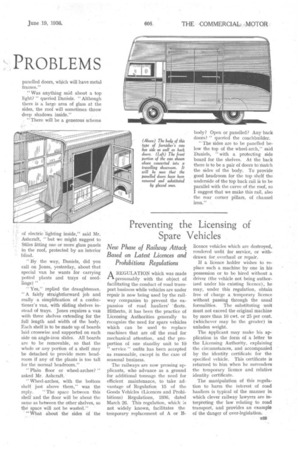Preventing the Licensing Spare Vehicles
Page 35

If you've noticed an error in this article please click here to report it so we can fix it.
New Phase of Railway Attack Based on Latest Licences and Prohibitions Regulations
Ak REGULATION which was made 1Th presumably with the object of facilitating the conduct of road transport business while vehicles are under repair is now being used by the railway companies to prevent the expansion of road hauliers" fleets. Hitherto, it has been the practice of Licensing Authorities generally to recognize the need for spare vehicles which can be used to replace machines that are off the road for mechanical attention, and the proportion of one standby unit to 10 " service " oufits has been accepted as reasonable, except in the case of seasonal business.
The railways are now pressing applicants, who advance as a ground for additional tonnage the need for efficient maintenance, to take advantage of Regulation 15 of the Goods Vehicles (Licenc'es and Prohibitions) Regulations, 1936, dated March 26. This regulation, which is not widely known, facilitates the temporary replacement of A or B-1
licence vehicles which are destroyed, rendered unfit for service, or withdrawn for overhaul or repair.
If a licence holder wishes to replace such a machine by one in his possession or to be hired without a driver (the vehicle not being authorized under his existing licence), he may, under this regulation, obtain free of charge a temporary licence without passing through the usual formalities. The substituting unit must not exceed the original machine by more than 10 cwt. or 25 per cent. (whichever may be the greater) in unladen weight.
The applicant may make his application in the form of a letter to the Licensing Authority, explaining the circumstances, and accompanied by the identity certificate for the specified vehicle. This certificate is returned to him when he surrenders the temporary licence and relative identity certificate.
The manipulation of this regulation to harm the interest of road hauliers is typical of the manner in which clever railway lawyers are interpteting the law relating to road transport, and provides an example of the danger of over-legislation.




















































































